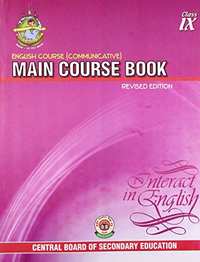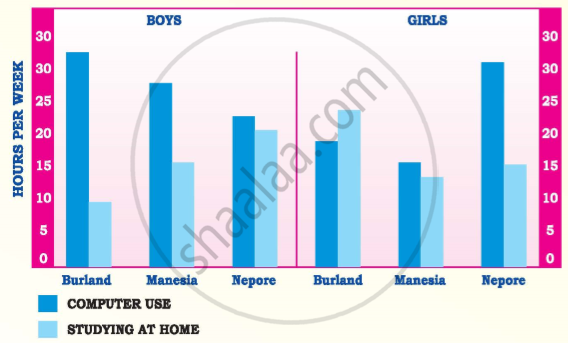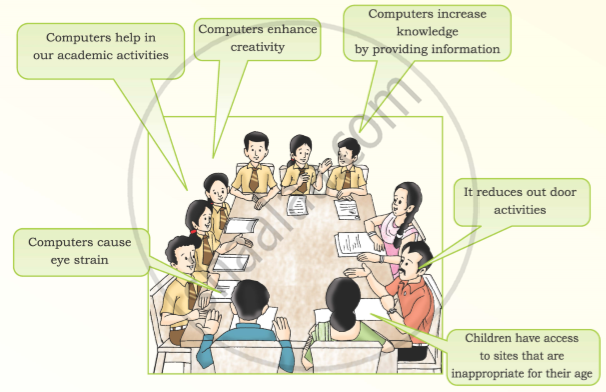Advertisements
Chapters
1.2: A Burglary Attempt
1.3: Can You Know People You Haven't Met
2.1: The Final Flight
2.2: The Sound of the Shell
2.3: Ordeal in the Ocean
3.1: The Indian Rhinoceros
3.2: Save Mother Earth
3.3: Save the Tiger
4.1: Radio Show
Chapter 4.2: Video Show
5.1: Bermuda Triangle
5.2: The Invisible Man
5.3: The Tragedy of Birlstone
5.4: Harry Potter
6.1: Tom Sawyer
6.2: Children of India
▶ 6.3: Children of Computer
6.4: Life Skills
6.5: We are the World
7.1: Grandmaster Koneru Humpy Queen of 64 Squares
7.2: It's Sports Day
7.3: Hockey and Foodball

Advertisements
Solutions for Chapter 6.3: Children of Computer
Below listed, you can find solutions for Chapter 6.3 of CBSE CBSE for English Communicative - Main Course Book Interact in English Class 9.
CBSE solutions for English Communicative - Main Course Book Interact in English Class 9 6.3 Children of Computer Exercise [Pages 120 - 126]
Complete the following information about yourself
SURVAYS ON THE USE OF COMPUTERS
| Age: | |
| Boy I Girl: | |
| Hours spent at the computer: | |
| Hours spent playing games and chatting on the internet: | |
| Hours spent surfing the Internet/ websites for learning: | |
| Hours spent per week studying at home: | |
| Hours spent for leisure activities: | |
| If you reduce your time spent on the computer, how would you spend the extra time? | |
| I like to spend my time on the computer because: |
Divide yourselves into groups and collect information on the use of computers from three students, each from classes VI, IX and XI. Compile and summarise your answers to the questions above in the following table
| Class | Name Girl/Boy | Hours per week | If you reduce your computer time , how will you spend your leisure time ? | Why do you like to spend time at the computer ? | |||
| At the computer | Studying at home | Internet | Leisure | ||||
Exchange information with another group and record it. Then in groups of four discuss the results of the following:
• Do boys and girls spend the same amount of time at the computer?
• Do their tastes and preferences change as they grow older?
• Are the number of hours spent at the computer/studying at home/leisure/ internet different between boys and girls?
• Do the number of hours per week spent at the computer/studying at home/ internet/ leisure activities change as students grow up?
Now listen to two speakers debating on the topic, 'School Uniforms should be Banned'. The script is given at page no 177 to 180. two student can be designated for this task
| NOTICE Class IX English Debate Motion : School Uniforms should be Banned Time : 2 mins (1 min for each speaker) Venue : School Auditorium |
Did you notice the phrases used by debaters to emphasise/negate certain points? Given below are certain expressions that might be used by debaters.
1. I'd like to raise a/the question/ argue ___
2. In my opinion ___
3. Nothing could be more illogical than ____
4. I feel very strongly that ___
5. I would like to draw attention to ___
6. I fail to understand ____
7. I thinkyou are being unreasonable in suggesting ___
8. I submit that ____
9. My first/ next/ final argument against/ in favour of ____
10. I support the motion that_____
11. My knowledgeable opponent has submitted that ____
12. May l ask ___
13. I strongly oppose/ support the view that ___
14. On the contrary ___
15. It is unrealistic to say that ____
16. I disagree ____
17. I firmly reject ____
18. I wholeheartedly oppose/ support____
Study the following graph and the accompanying report.

Our study of the time spent by students at the computer and studying at home in three countries has revealed some interesting facts.
First, the majority of boys and girls in the age groups of 14-16 in these countries spend more time at the computer than studying at home. Children in these countries spend an average of20-30 hours per week in comparison to 10-15 hours of studying at home. The only exception is Burland where girls spend more time studying at home than at the computer.
Secondly it is evident that in all three countries, time spent at the computer is having a serious impact on the number of hours spent studying at home. In fact, the greater the number of hours spent at the computer, the fewer number of hours are being spent studying. For example, boys in Burland spend an average of 32 hours at the computer while they spend about 8 hours studying at home.
Now prepare a graph based on the students' response to the survey you conducted in Question 2. Then write a report for the newspaper taking the help of Question 5, Question 3 and Question 6. You may follow this pattern:
Paragraph 1 : A suitable introduction as in B.4.
Paragraph 2 : Hours per week spent on different activities - classes VI, IX and XI compared.
Paragraph 3 : How extra time would be used - Classes VI, IX and XI compared.
Paragraph 4 : Boys and girls compared - Classes VI, IX and XI
The following words and phrases will be useful to you:
To express proportion
Most __
Many __
The majority of ___
A large number of ___
A small number of ___
Very few ____
Only a few ___
To express frequency
Most of the time ___
Frequently ___
Occasionally ___
Often ____
At times ___
To express comparison and contrast
__ compared with __
On the other hand, ___
In contrast, ___
By comparison, ___
___ however, ___
____ in comparison with ___
You may also find some of the phrases from B.5 useful.
This is a meeting of the school's Parent-Teacher Association. Some student representatives have also been invited to participate to discuss the role that Information Technology I Computers play in the growth and development of children.

You will now hold an actual class debate on the topic 'Computers and Children: A Boon or a Bane'.
In groups of four decide whether your group is FOR or AGAINST the motion. Then draft your debate. Each member of the group must participate in the written as well as the spoken matter. The spoken matter can be divided thus
• One introduces the topic
• One discusses points favouring the motion
• One argues the opponent's points
• One concludes
Solutions for 6.3: Children of Computer

CBSE solutions for English Communicative - Main Course Book Interact in English Class 9 chapter 6.3 - Children of Computer
Shaalaa.com has the CBSE Mathematics English Communicative - Main Course Book Interact in English Class 9 CBSE solutions in a manner that help students grasp basic concepts better and faster. The detailed, step-by-step solutions will help you understand the concepts better and clarify any confusion. CBSE solutions for Mathematics English Communicative - Main Course Book Interact in English Class 9 CBSE 6.3 (Children of Computer) include all questions with answers and detailed explanations. This will clear students' doubts about questions and improve their application skills while preparing for board exams.
Further, we at Shaalaa.com provide such solutions so students can prepare for written exams. CBSE textbook solutions can be a core help for self-study and provide excellent self-help guidance for students.
Concepts covered in English Communicative - Main Course Book Interact in English Class 9 chapter 6.3 Children of Computer are Reading, Writing and Grammar, Literature Textbook and Extended Reading Text.
Using CBSE English Communicative - Main Course Book Interact in English Class 9 solutions Children of Computer exercise by students is an easy way to prepare for the exams, as they involve solutions arranged chapter-wise and also page-wise. The questions involved in CBSE Solutions are essential questions that can be asked in the final exam. Maximum CBSE English Communicative - Main Course Book Interact in English Class 9 students prefer CBSE Textbook Solutions to score more in exams.
Get the free view of Chapter 6.3, Children of Computer English Communicative - Main Course Book Interact in English Class 9 additional questions for Mathematics English Communicative - Main Course Book Interact in English Class 9 CBSE, and you can use Shaalaa.com to keep it handy for your exam preparation.
